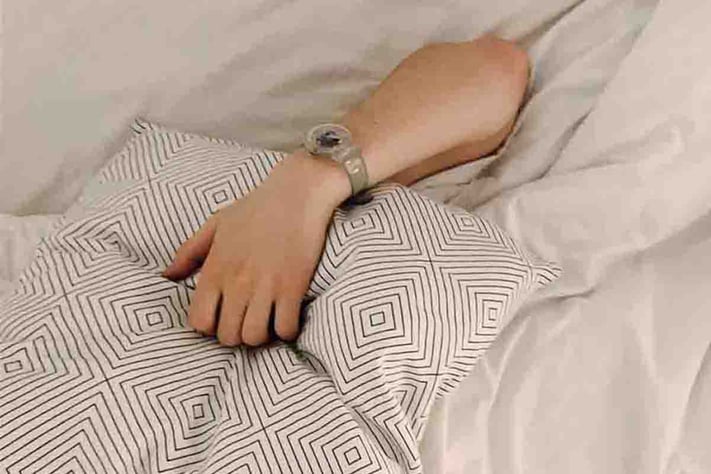
After a long day at work, you speed walk out of the office, eager to head home and put up your feet after a long and productive day. You go through the motions—endure your daily commute or drive, arrive at your house, kick off your shoes, start putting dinner together, and maybe even sneak in a bit of TV. When 10pm rolls in, you head off to bed, ready to turn in for the night.
However, when you settle in, you remember that it’s your aunt’s birthday tomorrow, and you haven’t found time to get her a gift. On top of that, there’s a report you forgot to revise and it’s due for a client meeting first thing tomorrow.
Suddenly, there are all these to-dos and tasks you haven’t gotten around to doing. Before you know it, you find yourself worrying over how to get all of them done.
When you finally check the clock on your mobile phone, you’re surprised to see that it’s one in the morning. You only have a handful of hours left to squeeze in a good night’s sleep.
Sleep Difficulties and their Risks

Sleep difficulties are normal. According to the National Sleep Foundation, it has been documented that difficulty in sleeping is experienced by 40% of Americans a few times each month.
In another study, sleep difficulties have been associated in increasing the risk of depression in older men. The study was conducted on Australian men between the ages of 70-90 and living in Western Australia. Here, it was found that 60% of respondents reported at least one sleep problem and that depression was higher among those who had difficulty initiating sleep.
While not the identified main cause, worry and rumination are the most common contributors for sleep abnormalities (Gross & Borkovec, 1982; Harvey, 2000; Haynes, Adams, & Franzen, 1981). The transition from wakefulness into sleep—officially known as sleep onset latency—is lengthened since cognitive arousal is triggered by these bedtime worries about past and future events.
Work-related thoughts like incomplete tasks and future to-dos also had a huge impact, causing a person to find it difficult to sleep.
Achieving Better Quality for Sleep
Since sleep is vital to one’s health and wellbeing, different methods have been tested in the attempt to help people. One method recruited healthy adults to participate in a multi-night sleep study that aimed to advance existing literature that looks into bedtime writing as a method for improving sleep onset latency.
Participants were separated into two groups—one group wrote about their next day To-Do Lists, another wrote about their Completed Tasks for the day. From there, one group was asked to spend five minutes writing down things they need to do the following day, or over the next few days. The other group was given similar instructions, but were asked to write down the different tasks they completed that day or even in previous days.
Based on the results, participants who wrote a To-Do list fell asleep more quickly. In fact, those who wrote more specific lists reduced their sleep onset latency further. This result came as a surprise because evidence showed that unfinished tasks became a main source of disturbance for people with sleep difficulties. Notably, this study also expounded on the latter results. They illustrated that while chewing on unfinished tasks disturbed one’s sleep, physically writing them down had a different effect on the participants.
Lifestyle Practices for Better Sleep

Aside from official sleep studies and research, there are other behaviors and practices that you may want to consider changing, especially when these relate to your lifestyle.
You might not realize it, but there are several habits that actually contribute to your sleeping difficulties. These habits are within your control, so it is possible for you to alter or get rid of them completely.
-
Put Away Your Phone
Have you ever caught yourself thinking: "I’ll just scroll through my phone a bit to help me sleep?"
The truth is, this is a trap you should avoid falling into. It’s easy to fall into the pattern of watching one last video posted from your favorite influencer or browsing through the items marked under SALE for “just five more minutes” on your favorite e-commerce website.
The list of things to occupy yourself with on your mobile phone can suddenly become endless. So overall, it would be better for you to turn off your phone at a certain time at night. This practice also applies when you’re watching television or playing at your computer.
Minimizing your screen time distractions help you develop better sleeping patterns. As a pro tip: make sure to avoid sleeping with your mobile phone under your pillow, as the temptation to check can become second nature. Instead, consider placing your device far from your reach.
-
Limit Your Caffeine Intake
Coffee is well and good when you’re trying to stay alert and awake. However, you may want to cut back on this in the evenings.
Scientifically speaking, caffeine plays a part in altering your brain’s melatonin levels. This can cause you to take much longer when you’re trying to fall asleep. Too much and too often, coffee can deprive you of much-needed rest.
If you’re not eager to kick the habit, consider gradually limiting your daily intake. You should also try to avoid drinking too close to your bedtime, so that the effects of caffeine have time to die down.
Instead, opt to drink soothing drinks: like chamomile tea or warm milk. Both of these have shown a positive effect in improving sleep quality.
-
Use Aromatherapy as a Sleep Aid
The use of essential oils for aromatherapy has become a recent trend. In fact, the scent of lavender has shown to increase the percentage of deep sleep among individuals who use it. In addition, people also reported waking up feeling more invigorated.
Consider looking up different oil combinations and experimenting with what works for you. There are a number of options available to help you achieve a deep sleep.
-
Avoid Taking Frequent Naps
When you are used to only getting poor quality sleep at night, this usually means that you will be drowsy throughout your day. Despite this, fight the urge to nap.
While napping has been linked to staying alert, it can have a negative effect on your regular sleeping patterns. If you nap for lengths at a time, around 2 hours or more, this can decrease the quality of your nighttime sleep and can even cause sleep deprivation.
If the need to nap is unavoidable, try keeping them to 15-30 minutes and only do so early in the day.
-
Follow a Schedule
In connection with avoiding taking naps, you must also be more proactive in helping yourself and your body.
According to a study by the European Journal of Social Psychology, habits are formed within 18 to 254 days. The same study also concluded that it takes an average of 66 days before a new behavior becomes automatic to you.
Make an effort to establish a sleep schedule and religiously follow it. Pick your best time to sleep at night and make sure that once you lay down in bed to avoid engaging in other activities such as reading, browsing through your social media feed, or watching movies.
-
Create a Personalised Sleep Ritual
Outside of practicing a lifestyle that can contribute to better sleep quality, we recommend establishing a personal sleep ritual.
Some examples to consider are:
- Journaling for at most 30 minutes before bedtime
- Meditating or doing some yoga stretches
- Taking a warm bath with 1- 2 hours before go to bed to help lower your core body temperature
Whatever ritual you choose, remember that this should go hand in hand with your sleep schedule. Make sure that your sleep ritual is completed before your scheduled bedtime.
-
Dim Your Bedroom Lights
If you’re more comfortable with turning the lights off, you can also do that. What’s important is to help your brain distinguish the difference between day and night through the brightness of your surroundings.
Bright lights that are left turned on can be recognized by the brain as daytime, thus preventing sleep. It also prevents the release of melatonin, a hormone that is released in response to the change of light.
Low levels of melatonin prevent you from reaching a state of quiet wakefulness that helps promote sleep. In fact, Harvard Medical School has recommended the use of dim red lights in order to help regulate your sleep schedule.
-
Practice Positivity
Negative thoughts are a known trigger for anxiety and depression. A good way of combating negative thoughts is by practicing and embodying positivity.
When you catch yourself thinking of the cons in a situation or blaming yourself for things you have not accomplished, make a conscious effort to shift your thoughts and focus instead on the things you can be grateful for.
Instead of dwelling on what went wrong, steer your thoughts towards possible solutions or how you can do better. Make an effort to praise yourself, as we are often our worst critics.
When these positive affirmations are repeated consistently, you rewire the way you think and encourage positive change to start from within.
-
Join a Guided Relaxation Program
If you find it difficult to focus on positive thoughts on your own, you can also try a guided relaxation program. This usually comes in the form of a recording where you follow a step-by-step process that is designed to help you relax.
There are numerous programs to help you focus on breathing and body relaxation. Others, help you visualise specific scenes that evoke happy, positive situations. Explore these different programs until you find one that works well for you.
-
Listen to Soothing Music
Another sleep ritual you can consider is listening to soothing music as you settle in for bed. Several studies have looked into the efficacy of music as therapy for those with sleep disorders. An official therapy session is often conducted in a clinic designed specifically for this and a professional will guide you to achieve your specific health and wellness goals.
This is also something you can still try to do on your own. Build a separate playlist for relaxation. This should be different from your work or exercise playlist because the goal is to relax, not to get hyped.
As much as possible, choose music without lyrics. This way, you can focus on the sound instead of falling to the temptation of singing along. Nature sounds or classical music are good genres that you can listen to.
-
Regulate Your Room Temperature
Your room’s temperature directly affects your sleeping patterns. Because of that, it’s important that your room temperature is set at a level that will neither be too hot nor too cold so that your sleep cycle won’t be disturbed.
Your body goes through a 24-hour cycle called the circadian rhythm, where your body’s internal temperature experiences a shift as night approaches. The lowest point in the body temperature usually occurs at about 4 a.m. and peaks at about 6 p.m.
This is the main reason why your room’s temperature should ideally be between 15.6-19.4°C (60-77°F).
-
Remember to Stay Warm
Apart from regulating your room’s temperature, you also need to make sure you’ll stay warm while sleeping—especially if you live in a country that experiences winters.
You can opt to wear clothing—sweaters, pajamas and socks—that are made out of wool, cotton or silk. These are natural fibres that can keep you warmer than synthetic ones. You can also drink warm drinks like tea or warm milk. As mentioned earlier, outside of keeping you warm, these can also help you achieve deep sleep.
Additionally, there are heating options that you can try. You can choose to go traditional by keeping a bottle of hot water where you’re most cold. Make sure that it is wrapped in cloth so you can avoid scalding yourself. Or you can use more modern methods that are safe and easy to use like heating devices.
Warmth and Wellbeing from Wellcare
Fortunately, there are heating devices like electric blankets that are perfect options to keep warm. Specially designed products like Wellcare’s heated electric blanket, use a new technology called 4D Dynamic Warmth Flow. This product delivers warmth more efficiently and creates a more comfortable temperature around you. It is unlike ordinary electric blankets that only warm you when your skin is in direct contact with it.
This product also has several features that make it very convenient to use. Made out of premium-quality and machine-washable fleece and accompanied by an additional foot warmer, this electric blanket also comes with dual controls. This allows you to adjust the temperature for both the blanket and the foot warmer so that it’s right for you.
Additionally, we have electric blanket designs like the BBC Design that provide breathability and 360 degrees of warmth flow circulation. It has 3D circular holes that allow strands of warmth to transfer quickly and evenly to the body. You can also choose between a two-hour and eight-hour timer, depending on how long you want to stay warm while sleeping. Find out more about our electric blanket with BBC design on this link.
Give yourself the chance to recharge so you can continue functioning through life without any health concerns bogging you down. Make an effort to curate a lifestyle and home atmosphere that will always allow you a restful and good night’s sleep. Afterall, the quality of your sleep is valuable and has an impact on your overall well being.
Spreading care to everyone around us is Wellcare’s tradition. This is why we focus on healthcare products and relaxation technologies that deliver a better life experience. Click on the button below and learn how you can experience warmth the Wellcare way.


.png?width=512&name=united-kingdom%20(1).png)


